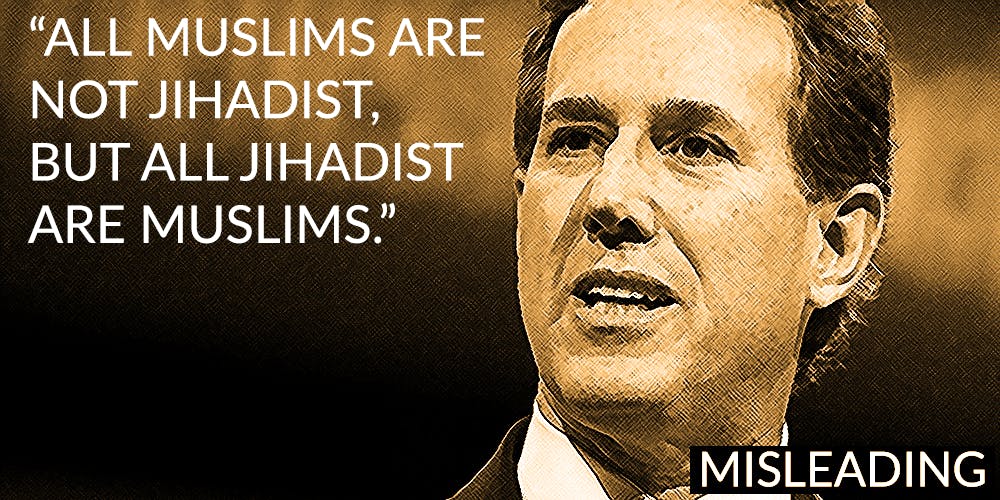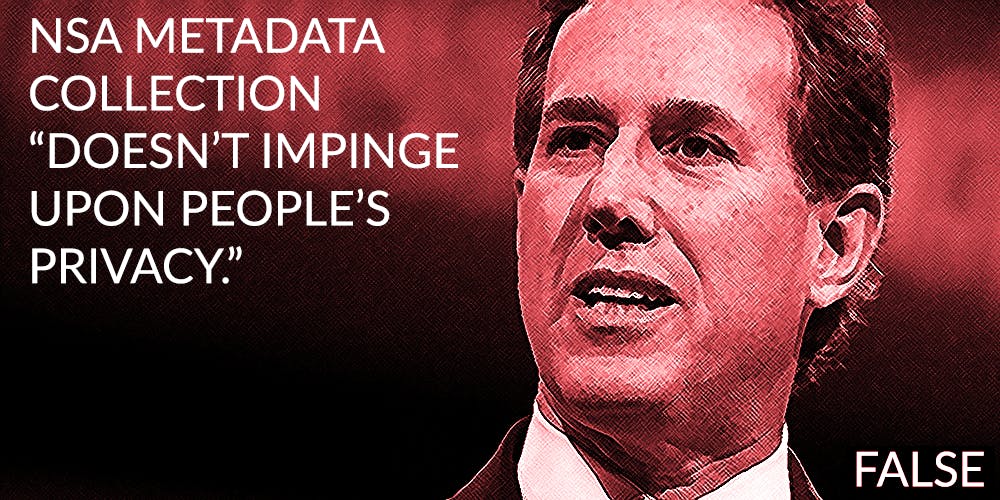Donald Trump and a dozen other GOP candidates took the stage on Tuesday night for the last Republican presidential debate of 2015.
The exchanges between the candidates grew tense during the national security-focused discussion, especially between Trump and former Florida Gov. Jeb Bush, as well as between Sens. Ted Cruz (R-Texas) and Marco Rubio (R-Fla.).
We have lost all control #GOPDebate pic.twitter.com/NAgi7kczIV
— Layer 8 (@dotlayer8) December 16, 2015
Through the fights and discussion, candidates spouted facts covering a swath of issues related to national security—many true, others false. Here are the fact-checks of some of Tuesday night’s most important claims.
Iraq
Trump claimed once again that he was loudly and publicly against the Iraq War before it began. He’s made the same claim in previous debates.
It’s not true.
Trump barely spoke about the Iraq war either beforehand or in its early days. One week after the American invasion began, he said, “I think the market’s going to go up like a rocket!”
His opposition to the war began in earnest in 2004. That’s not as early as Trump keeps claiming, but it is much earlier than most in the Republican party.
Refugees
As he argued against the U.S. accepting refugees from the Middle East, Sen. Rand Paul (R-Ky.) claimed that no one in the region was doing anything about the massive refugee crisis.
While Paul may not be satisfied with the region’s response, countries like Turkey, Lebanon, Jordan, and Egypt have taken in over 4 million refugees.
Bush then tackled the crisis by saying that destroying the Islamic State will totally solve the refugee crisis and, therefore, that doing so should be our total focus.
That’s false because the refugee crisis began in 2011, before the Islamic State took any significant land in Syria. There’s no reason to believe the problem would be solved if ISIS, which represents just one of several sides in the Syrian war, was destroyed.
Immigration
Cruz’s claims about deportation during the Clinton and Bush presidencies are astronomically false. Clinton deported around 800,000. Bush deported around 2 million.
In the entire U.S., we have an estimated 11.3 million illegal immigrants, according to Pew Research, meaning Cruz’s claim is wildly out of sync with history.
Russia
America’s relationship with Russia was at the center of several discussions on Tuesday night.
One moderator asked former HP CEO Carly Fiorina if her pledge to not speak to Russian president Vladimir Putin was impractical and displayed weakness. Fiorina responded by saying she never made such a promise.
She’s in the wrong, however. Fiorina has repeatedly said she wouldn’t talk to Putin “at all.”
Iran
President Barack Obama‘s nuclear deal with Iran came under scrutiny when former Arkansas Gov. Mike Huckabee compared it to Obama’s relationship with Israel.
In fact, Iran’s economy has been devastated by American-led economic sanctions. Meanwhile, the U.S. is considering increasing aid to Israel to $5 billion annually, from the current level of $3 billion per year.
That’s 67 percent increase in funds to the country that is already the biggest recipient of U.S. foreign aid, making Huckabee’s statement plainly false.
Islam
The Muslim religion was a major focus of Tuesday night’s debates.
Sen. Lindsey Graham (R-S.C.), who appeared during the undercard debate with three other low-polling candidates, repeatedly defended the majority of the world’s Muslims from any perceived attack, insisting that gaining Islamic allies was America’s surest path to victory against ISIS.
Despite their prominence and multiple military victories, Muslims around the world say they hold overwhelmingly negative views of ISIS.
Former Pennsylvania Sen. Rick Santorum, meanwhile, defended Trump’s recent proposal to ban Muslims from entering the U.S. during the undercard debate.
Santorum’s statement is technically true—jihad is a Muslim term and practice, after all—but it misleads when it comes to what jihad is and, more broadly, who commits terrorism.
Jihad, meaning “to strive,” can take violent and non-violent forms. Islamist terrorists believe they are committing jihad, but so do Muslims with entirely peaceful goals.
More importantly, Santorum’s statement implies that terrorism is exclusively (or at least mostly) the domain of Islam. That’s not true in any sense, and it’s not true in the United States.
In the last 14 years, non-Muslim violent attacks have killed more Americans than Islamic attacks.
NSA spying
In a debate over the U.S. government’s power to spy on American citizens and others around the world, Santorum claimed that the National Security Agency’s metadata collection had no effect on anyone’s privacy.
Whether or not you support NSA spying, any clear-minded look at the issue will show that it does affect people’s privacy. But don’t take our word for it.
Judge Richard J. Leon of the United States District Court for the District of Columbia found in November that the NSA phone metadata-collection program, which has since been shut down, was likely unconstitutional.
In his ruling, Leon said the legal battle over NSA’s mass metadata collection is but the latest chapter “in the ongoing struggle to balance privacy rights and national security interests under our Constitution in an age of evolving technological wizardry.”
The question of whether or not effect on our privacy is worth it is entirely different—and highly subjective.
Photo via Michael Vadon / Flickr (CC BY 2.0) | Remix by Max Fleishman











